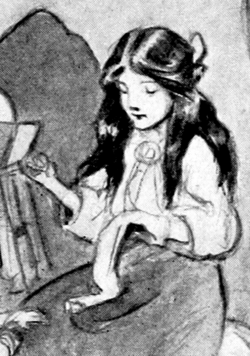 Wendy Darling drawn by Oliver Herford in The Peter Pan Alphabet | |
| Pronunciation | ( /ˈwɛndi/ ) |
|---|---|
| Gender | Female |
| Language | English |
| Other names | |
| Alternative spelling | Wendi |
| Related names | Gwendolyn, Gwen, Wendeline, Wendelinda, Winifred |
Wendy is a Welsh feminine given name.
In Britain during the English Civil War in the mid-1600s, a male Captain Wendy Oxford was identified by the Leveller John Lilburne as a spy reporting on his activities. [1] [2] It was also used as a surname in Britain from at least the 17th century. [3] Its popularity in Britain as a feminine name is owed to the character Wendy Darling from the 1904 play Peter Pan and its 1911 novelisation Peter and Wendy , both by J. M. Barrie. [4] [5] [6] Its popularity reached a peak in the 1960s, and subsequently declined. [7] The name was inspired by young Margaret Henley, daughter of Barrie's poet friend W. E. Henley. Margaret reportedly used to call Barrie "my friendy", with the common childhood difficulty pronouncing Rs this came out as "my fwendy" and "my fwendy-wendy". [8] [9]
Contents
- People
- Business and politics
- Film, theatre, television, and radio
- Sports
- Arts
- Science and engineering
- Other
- Fictional characters
- References
In Germany after 1986, the name Wendy became popular because it is the name of a magazine (targeted specifically at young girls) about horses and horse riding.